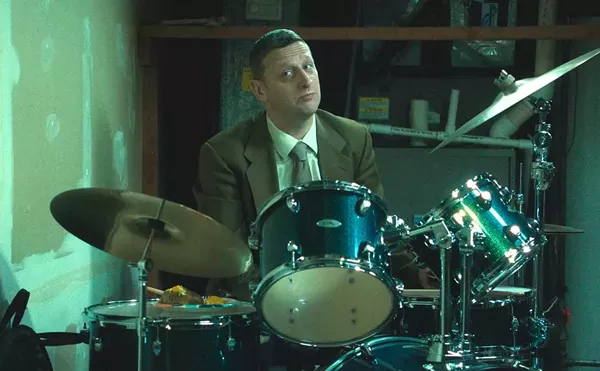
Audio By Carbonatix
[
{
"name": "GPT - Leaderboard - Inline - Content",
"component": "35519556",
"insertPoint": "5th",
"startingPoint": "3",
"requiredCountToDisplay": "3",
"maxInsertions": 100,
"adList": [
{
"adPreset": "LeaderboardInline"
}
]
}
]
It's been nearly 30 years since we've gotten decent werewolf film. Back in 1981, Joe Dante's clever and creepy The Howling (penned by John Sayles) slipped in and out of theaters, while John Landis' snarky scarefest, An American Werewolf In London, hit big at the box office. Both found a contemporary twist on the genre, and both delivered. Since then, Hollywood hasn't been kind to the creature. Mike Nichols gave us Wolf, (which was a lot less intelligent than it thought it was), while the Underworld films reduced lyncathropes to silly goth anti-heroes. As my colleague Corey Hall smartly pointed out, the best werewolf story in a decade was The Incredible Hulk (think about it).
Now, nearly 70 years after the The Wolf Man (1941) first hit the screen, Universal has decided to revive its creature feature as a moody period piece set in Victorian England. But is it a sign of the Twitter age that the title has been condensed from three words to two?
Returning home to his childhood mansion after his brother's grisly and mysterious death, Lawrence Talbot (Benicio Del Toro) investigates a nearby gypsy encampment, only to be attacked by a vicious monster. Nurtured back to health by his brother's widow, Gwen (Emily Blunt) — who looks an awful lot like his mother — an understated attraction blossoms. Is it connected to his half-remembered dreams of Daddy (Anthony Hopkins) cradling his dead mom after she committed suicide by slitting her own throat? You think? It hardly matters, since the movie's too impatient to get to predictable chase sequences through the cobbled streets of London or fog-blanketed English forests. After an intriguing setup, The Wolfman awkwardly barrels from one set piece to the next, never connecting them with meaningful characters or emotions.
While the update boasts lots of artfully composed violence and sumptuous art direction, it's disappointingly mediocre. Not only is the drama turgid and indifferent, the movie wastes Del Toro in what should've been a tour de force performance but instead becomes another mumbly depiction of a passive protagonist. Plain and simple, Johnston, and his screenwriters Andrew Kevin Walker (Se7en) and David Self (Road to Perdition), don't give their lead anything to do. Buried in their misshapen story is the potential for a decent mystery (who is the original werewolf?), but they botch its execution. Del Toro's character is always reacting, never discovering. Worse, we actually seem to learn less about him as the movie goes on. He's revealed as an Edwin Booth-type actor at the film's opening but nothing's ever done with that information. He's got issues with his emotionally distant father but exchanges few words with the man. Del Toro isn't even given film time to reflect on the horrific violence he's committed as a werewolf. It's as if the filmmakers willfully set out to thwart any attempt the actor might make toward establishing a flesh-and-blood character. It couldn't stand in starker contrast to the room Guy Ritchie afforded Robert Downey Jr. in Sherlock Holmes.
Some critics blame studio meddling for the tepid results, since visualist director Mark Romanek (One Hour Photo) was ousted mid-shoot in favor of get-it-done studio man Joe Johnston (Jumanjii, Jurassic Park 3). While the movie begs for better execution on its pivotal scenes — an asylum attack comes immediately to mind — and its pacing is a mess, the critique overlooks the script's myriad shortcomings.
The key to any wolf-man story is its sense of tragedy. Lyncanthropy is a curse, a horrifying disease that undoes otherwise decent men by unleashing the monster within. Whether it's the metaphorical beast stifled by Victorian society or the repression of extreme childhood trauma, the audience should be invested in the protagonist's struggle to not harm loved ones and to be cured.
Johnston and company think that their clunky attempt to bolt Freudian psychology onto a paint-by-numbers monster movie with cheap startles, brooding atmospherics, brutal maimings and noisy action scenes is enough.
But even as an old-fashioned horror flick, The Wolfman underwhelms, with stalkings that never build suspense and chases that never thrill. All the bombastic music (courtesy Danny Elfman) and eardrum-splitting sound effects in the world can't hide the fact this monster movie has no bite.
Jeff Meyers writes about film for Metro Times. Send comments to letters@metrotimes.com.





